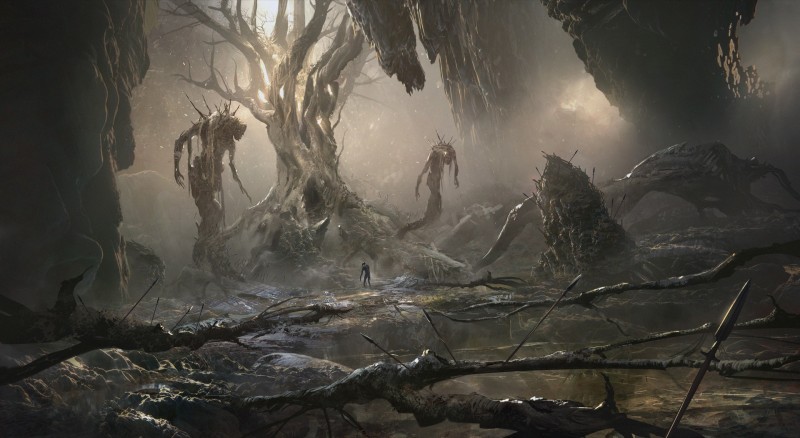Please support Game Informer. Print magazine subscriptions are less than $2 per issue

The Inside Story Of Take-Two's New Publishing Label, Private Division
The video game industry is built on unsteady ground. Its tectonic plates constantly shift as this $100 billion global business expands to new platforms, publishers search for new revenue models, and studios rise and fall. The volatile but lucrative console market makes it hard for anyone but the most entrenched development teams to maintain solid footing over a long period of time. Why spend hundreds of millions of dollars on novel new ideas that could fail in this hypercompetitive landscape when you could sink more marketing and funding into sure bets like Madden, Call of Duty, and World of Warcraft, making them living services that continue to receive new content throughout the year?
The argument makes sense from a short-term business perspective, but playing it safe stifles innovation, which could hurt these companies and brands in the long run. This leaves the door wide open for a disruptor like Private Division to emerge. This new Take-Two publishing label stands alongside Rockstar and 2K Games, but it plays by much different rules. Rather than going big with benchmark-setting endeavors like Grand Theft Auto or supporting perennial juggernauts like NBA 2K, the new label’s directive is to identify smaller teams of experienced developers with great ideas, fund their projects, and in a surprise twist, let the studios keep the rights to the intellectual property.
Private Division’s unconventional approach found a receptive audience in the many talented developers burned out from working on 300-person teams and playing office politics. The first four studios that signed deals with the newly formed publisher boast impressive resumes with games like Assassin’s Creed, Fallout, Halo, and Battlefield. Each is a smaller-scale project with smaller teams that maintain the production values gamers expect in a triple-A title, but deliver an experience tighter in scope and scale (think Ninja Theory’s Hellblade: Senua’s Sacrifice). All are bringing new concepts they are passionate about to life in the hopes of finding the footing that can prove so elusive in this industry.
Action Publishing
Michael Worosz is no stranger to risk. A former naval intelligence officer who once held the nation’s top security clearance, Worosz’s idea of a good time is scaling mountains and either biking or skiing back down, depending on the season. That comfort with danger serves him well in the high stakes world of business development, where he’s aided Take-Two for the last seven years.
While looking for acquisition and investment opportunities in recent years, Worosz kept coming across a similar type of pitch that didn’t quite fit under either the Rockstar or 2K Games umbrellas. “We assessed the market and saw numerous instances of proven creatives darkening our door who had left major studio systems and were interested in working on something more entrepreneurial,” he says. “They were more enamored with the idea of focusing on the game product and leading smaller, more nimble teams, and were less interested in working in 300-400 person organizations for five-plus years to bring a new quad-A game to market.”
As the landscape stood two and a half years ago, publishers weren’t funding many of these types of projects. Indie houses like Devolver focused on more nimble, lower budget games like Hotline Miami, major publishers concentrated on the triple-A and mobile spaces, and private equity companies were more enamored with lucrative mobile gaming investments. Mid-sized studios looking for backing beyond crowd-funding and self-funding had few options, despite their promising game ideas and impressive track records.
Sensing an untapped talent market ripe for the picking, Worosz put together a pitch for chairman and CEO Strauss Zelnick. He saw the potential as well, and gave Worosz the green light to create a new Take-Two publishing label specializing in identifying and supporting the most promising “triple-I” projects. Private Division was born.

Project Wight
Zigging Instead Of Zagging
In game development, creators rarely have the last word when it comes to the execution of their vision. Too often in large-scale publishing, their concept can be compromised by too many cooks in the kitchen. This can create schisms between the business and creative camps, such as the Call of Duty creators Vince Zampella and Jason West’s ugly and litigious falling-out with Activision.
Relinquishing control of the IP or leaving creators to their own creative devices may be a non-starter for the vast majority of A-tier game publishers, but other media has evolved beyond this paradigm. Many Hollywood studios and record labels understand they don’t need to demand complete control over a project to develop a beneficial relationship.
“This is the thing I take from Strauss Zelnick's playbook,” Worosz says. “He's been a career entertainment executive who has worked in Hollywood, music, and now video games …. What that means practically is no one on the Take-Two management team will ever opine on how a game should look, feel, or play. No one's ever going to tell the people in the studios that we've partnered with what a game should look like. That's for the team on the ground working on that game every day.”
Worosz understood that by offering the game development Holy Grail no other publisher was even willing to discuss, let alone surrender, Private Division had a great opportunity for attracting top talent to its label. All the developers we spoke with at Panache, Obsidian, V1 Interactive, and The Outsiders said retaining their IP was the most significant factor in signing with Private Division.
“We didn't want to cede control of this thing, essentially,” says The Outsiders co-founder David Goldfarb, the former Battlefield: Bad Company 2 and Payday 2 lead whose studio is publishing its first game with Private Division. “You always hope for the best, but maybe in some cases, and I know from talking to friends of mine, you lose control of the thing that you spend an enormous amount of energy and time on.”
For The Outsiders, controlling its IP is essential for its other business endeavors. The founders see their studio as an entertainment company that hopes to extend the IP through movies, TV, clothing, comics, and other merchandising opportunities.
Beyond the IP retention, receiving backing from a major publisher also helped these studios in another critical era – talent acquisition. “It was way easier for us to recruit new team members,” says Panache Digital co-founder Patrice Désilets. Best known for his work on the formative Assassin’s Creed titles, his next title, Ancestors: The Humankind Odyssey, is being published under the Private Division label. “The ecosystem here in Montreal is really competitive, so when we could say to people, ‘We're not only a studio with a little bit of money, but we're being backed by real pros, so don't worry and come join us instead of going to the big studios.’ It helped us a lot.”

Dreamweavers
Since the studios control the creative vision and execution, Private Division had to re-examine the fundamental publisher/developer relationship. The label needed to embrace a reactive approach that foregoes making broad decrees about game direction and instead enables teams to overcome any potential roadblocks that arise during development. To do so, Worosz hired a VP of production with first-hand experience sitting on the other side of the table.
A longtime developer with an impressive resume that includes stints at Bungie, Microsoft, and PopCap, Allen Murray strives for Private Division to be a “light-touch publisher.” He doesn’t want a lot of label employees attached to these projects in positions that could strong-arm the creative vision. Instead, he thinks about how to best support the projects.
“I think we sometimes act as therapists,” Murray says. “We hear about all these things they are worried about and take it all in and think about it and try to help them find a solution. Or maybe we just listen, you know? Just help them bear that weight. Because it's a lot.”
The studio leads we spoke with all voiced appreciation for this approach, singing praises for Murray and his team. “I feel a lot more respect about the craft of game making, and that they let us continue having this grand vision and enable us to be even better than what we think we can be,” Désilets says. “We goof up and they say, ‘Look, we know what you can do, but what about this, what about that?’ You're having a really good conversation about gaming.”
“I think it has all the strengths of the traditional publisher relationship but because we get to retain ownership of the IP, it's one of the things where I don't think we're worried about our goals aligning with the publisher goals,” says Obsidian Entertainment’s Tim Cain, who has reunited with fellow Fallout co-creator Leonard Boyarsky to develop a new RPG under the Private Division label. “We both want to see the IP be very successful because we are both vested in it.”
The Gaming Gambit
Private Division now has four projects in full production, but don’t expect a rapid set of release dates. Murray worked carefully with each studio to map out realistic development timelines that take into account the business realities of building a studio in addition to the game. These releases will likely extend into the latter half of 2019.
“Video games are literally at the point where art meets science, right?” Worosz says. “But very few things go according to a predefined, scientific plan, especially in terms of video game production. Things are going to move around and we're going to make sure that each game has its own moment in the sun.”
Once the games get closer to completion, Private Division can flex Take-Two’s considerable muscle as an experienced publisher to aid with quality assurance, console certification, localization, and getting the word out about the games. Though the majority of the Private Division staff operates independently from the rest of Take-Two, they share one critical resource: the global sales force.
“With regards to getting the game out there in front of people with marketing and making sure they have all the right avenues and the right amount of cash to put into it, we are so glad they are driving that part of it because if we were completely independent and trying to self-fund or use Kickstarter or something like that, even if you make a great game it's so difficult to get it out there in front of people's eyes and to get people to notice,” says Marcus Lehto, a former Halo and Destiny senior developer whose new studio V1 Interactive is working with Private Division on a sci-fi shooter.
All the games will launch digitally first, but should there prove to be demand, Private Division has the means to bring the games to traditional retail channels as well.
In one sense, getting these exciting ideas off the ground and out the door is the “easy” part for Private Division. They have that process mapped out already and the talent to execute. But what happens after this initial lineup of games ship is still up in the air.
Does the label continue to identify and fund exciting new IP with other indie studios, or does it instead take a more conventional publishing approach and rally around a game where they see franchise potential? Do they continue to make acquisitions, as it did with Kerbal Space Program? These are questions with a lot of moving parts, and Private Division isn’t dismissing any potential avenue for growth.
“We've been open to being malleable and changing so I expect us to be constantly evaluating that,” Murray says. “You raise a lot of very good and obvious questions, and the answer is we're figuring that out. We want to be able to support these games and these developers as they grow. That may mean that we grow and change with them.”
In the meantime, the four games under Private Division continue to revel in their creative freedom, hoping to reignite the spark that helped their studio partners come up with brilliant concepts like Assassin’s Creed, Halo, and Fallout.
“To be honest with you, it feels a lot like the early game days,” Lehto says. “Initially it was just myself and Jason Jones doing Halo for a number of months before we brought on a larger team. Even still, that team was very small for a large portion of the development of Halo 1. And that was true even at Bungie when we were beginning to develop Destiny. The best work that I think a studio can do is when it's got that small team that's hyper-focused on that creative idea and is able to rapidly innovate those creative ideas.”
Private Division is betting on it.










